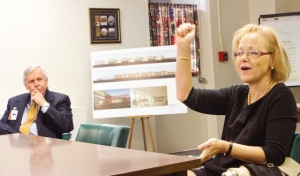DHHS chief takes tour of Cherry Hospital
By Steve Herring
Published in News on November 14, 2013 1:46 PM

News-Argus/STEVE HERRING
State Health and Human Services Secretary Aldona Wos, right, talks with members of the Cherry Hospital executive staff Wednesday after her tour of the hospital campus. At left is Cherry Hospital CEO Luckey Welsh.
The sheer number of state jobs means there is not enough money in North Carolina to increase the salaries of all state employees, and any increases must be strategic, state Health and Human Services Secretary Aldona Wos told the executive leadership at Cherry Hospital during a tour of the hospital Wednesday.
Also, the enormous amount of money the state is having to spend on Medicaid is leaving less money to work with, she said.
During the meeting Wednesday, hospital staff talked about the challenges facing the hospital, including recruitment and retention of nurses and physicians.
Ms. Wos told staff members she wanted to hear their concerns. She told them to be direct in their comments and not "skirt around the issues."
"Recruiting is something that you need to be very creative with," she said. "We have worked extremely hard since January to plead the business case with the governor, and he gave his blessing. Then we pleaded the case with legislators to give you flexibility of increasing salaries for your professional staff.
"Now, flexibility does not mean that all of a sudden millions of dollars dropped into your pocket that you can now give everyone increases in salaries and hire at the top end. But it means that you have flexibility, that you are not bound by what you were before."
Better salaries are needed to hire and retain nurses, Ms. Wos said. Those who go to UNC Hospitals or Duke can make thousands of dollars more, so naturally that is where they are going, she said.
"It is a different world now. There is no more money. You have to be creative and justify and figure it out. Do your business case and be creative, and do piecemeal it, and it somehow will all eventually come together."
Ms. Wos has been sharply criticized for some of her own personnel decisions, particularly the hiring of two 24-year-old former campaign aides of Gov. Pat McCrory. The two hold senior-level offices and have salaries of more than $85,000.
Cherry Hospital CEO Luckey Welsh said a new salary scale set for physicians is helping the hospital.
"It would be great if we could do that for nurses and some other areas like IT (information technology)," he said.
IT is being addressed selectively as well by the state since a large portion of IT services are through contract employees, Ms. Wos said.
There is a lack of money because of what the state spends annually on Medicaid -- about $13 billion -- she said. The amount is growing annually, she added.
"Therefore there is less and less to put into anything else but Medicaid," she said. "That is why we have been working on Medicaid reform since January. We will have a finished product by the 17th of March to present to the Legislature.
"If they agree, we will go to the feds to ask for a waiver and permission. We will be implementing it, if all goes well, by the end of (20)15 into '16 for the state."
Also a part of that effort is the reorganization and consolidation of Local Management Entities and Managed Care Organizations that are responsible for managing, coordinating, facilitating and monitoring mental health services, Ms. Wos said.
That will make the organizations more sustainable and increase accountability, she said.
"As we think about consolidation of MCOs we want to make sure that the MCOs that survive are the ones that do the best value in the community," said Dr. Jim Mayo, Cherry Hospital clinical director. "We want more penetration of care, not what strong finances they have on their books, but how do they meet the needs of the people in the community."
After speaking with the staff, Ms. Wos spoke on McCrory's Crisis Solutions Initiative to improve mental health and substance abuse crisis services in the state.
Work has been under way on the initiative since January, she said. It will include the creation of a Crisis Solutions Coalition of health care, government, law enforcement and community leaders to identify help for people experiencing a mental health or substance abuse crisis so they receive the most effective care.
It will seek ways to identify and expand existing best practices that have been proven to work on the local level, Ms. Wos said.
A primary goal is to ensure that people experiencing a crisis would receive timely specialized psychiatric treatment in coordination with available and appropriate community resources, she said.
For example, people would be taken to the appropriate facility instead of to a hospital emergency department or even a jail, she said.
Between Oct. 1 of last year and Sept. 30 this year, the Wayne Memorial Hospital Emergency Department treated an average of 119 patients per month for psychiatric care.
The initiative would look at ways to relieve that burden on emergency departments, something that hospital officials would love to see, Ms. Wos said.
